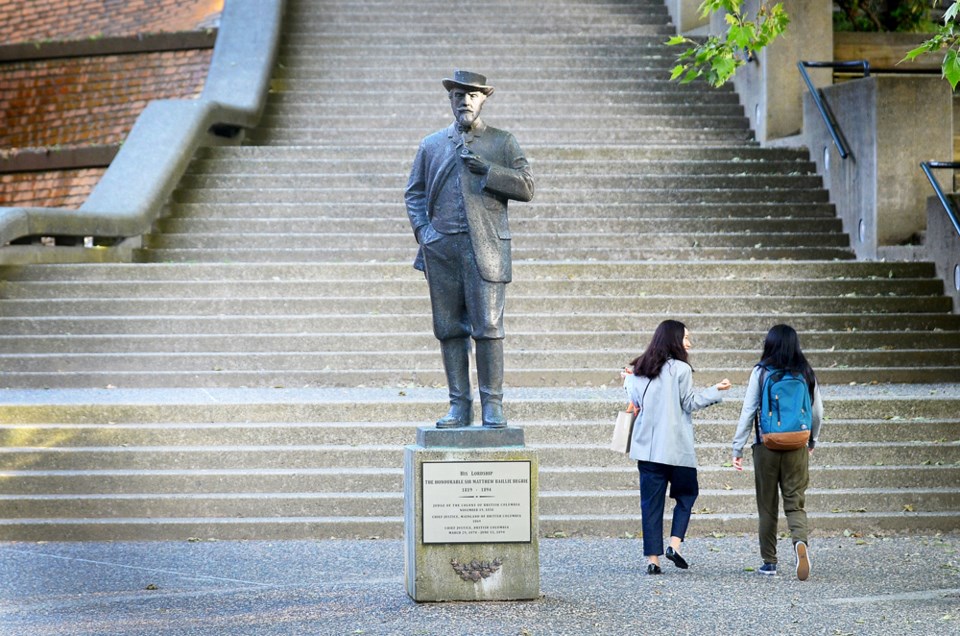Two New Westminster councillors want their council colleagues to support the removal of the Judge Begbie statute from in front of the Provincial courthouse on Carnarvon Street.
Councillors Nadine Nakagawa and Chuck Puchmayr have put forward a motion that will be considered at Monday’s council meeting. Along with calling for the removal of the statue, the motion recommends the city: engage in a conversation with the Tŝilhqot’in Nation about the history and legacy of Judge Begbie and the effects his decisions had on generations of their people; work with the city’s museum and archives, the community and the Tŝilhqot’in Nation to find an appropriate place for the statue; and engage in a process of consultation to find an appropriate place to tell the history of the Chilcotin War.
According to the motion, the reasons for removing the statue include:
* In 1864, Begbie presided over a trial in Quesnelle, in the Colony of British Columbia, that resulted in the wrongful hanging of Chief Lhats’as, Chief Biyil, Chief Tilaghed, Chief Taqed and Chief Chayses of the Tŝilhqot’in Nation.
* In 1865, Chief Ahan was also wrongfully hanged in New Westminster.
* The Tŝilhqot’in chiefs, who were at war with the Colony of British Columbia, were deceived into meeting with the colonial government for the purpose of peace talks.
* In 2014, the provincial government apologized to the Tŝilhqot’in Nation for hanging the chiefs.
* In 2018, the federal government exonerated the chiefs.
* The Judge Begbie statue is a symbol of the colonial era and this grave injustice.
* The execution of the six Tŝilhqot’in chiefs changed the relationships and was used as a threat to all Indigenous peoples attempting to defend their land.
In 2017, the Law Society of B.C. decided to remove its statue of Begbie from its Vancouver offices. That prompted disucssions about whether the statue in New Westminster should also be removed.
“I have hard feelings. I don’t think much of the hanging judge,” Tsideldel Chief Ervin Charleyboy told the Record at the time. “It would give me great pleasure to get a big excavator or something and lower him with a rope. That would be the end of that hanging judge.”
Like Charleyboy, Tl'etinqox Chief Joe Alphonse told the Record that a statue or statues of the six war chiefs should be erected if the Begbie statue remained in place.
“If you’re going to tell the story, don’t tell half the story. Tell the whole and complete story,” Alfonse said. “They haven’t told the other side.”
The motion to be considered next week is the latest move by the city to address truth and reconciliation and build relationships with First Nations, including the Tŝilhqot’in Nation.
The City of New Westminster, which has endorsed the Truth and Reconciliation Commission’s calls to action, has taken a number of steps related to truth and reconciliation and relationship-building with First Nations. These include:
* In 2017, the city delivered one of its old fire trucks to the Anaham reserve, a vehicle that was quickly put to use fighting forest fires that summer.
* In December 2018, council endorsed the Truth and Reconciliation Commission's 2015 report, Honouring the Truth, as well as the Truth and Reconciliation Commission's 94 "calls to action" and the United Nations Declaration on the Rights of Indigenous Peoples. The city will use the declaration as a framework for truth and reconciliation.
* In 2018, the city donated and delivered two New Westminster Police Department vehicles to the Tŝilhqot'in First Nation. While the vehicles had come to the end of their life for “rapid response, all day long, speeding and lights and sirens” requirements in the city, they can still be used for more casual use.
* In 2018, council approved a motion authorizing the mayor and city clerk to sign agreements to bind the city into a sister community relationship with the Tl'etinqox (Anaham) government, if an agreement is accepted by that government.
* In February 2019, the city hired the Castlemain Group to develop a framework that will develop a framework to lead the city through reconciling its past and present relationships with the Indigenous community.
* On April 29, council approved a series of items related to truth and reconciliation, including: making it mandatory for all city staff to attend training on the history and legacy of residential schools; providing mayor and council with training to understand the legacy of residential schools and colonialism; undertaking research to understand which Nations have a relationship to this land; undertaking research to better understand the historical actions of the city as they relate to First Nations; providing the community with opportunities to learn the history and legacy of colonialism in New Westminster; and establishing a formal territorial acknowledgement built from the information learned from First Nations during the research process, and having the territorial acknowledgment approved by First Nations that claim the territory before it’s formally adopted by the city.
with files by Cornelia Naylor/The Record



